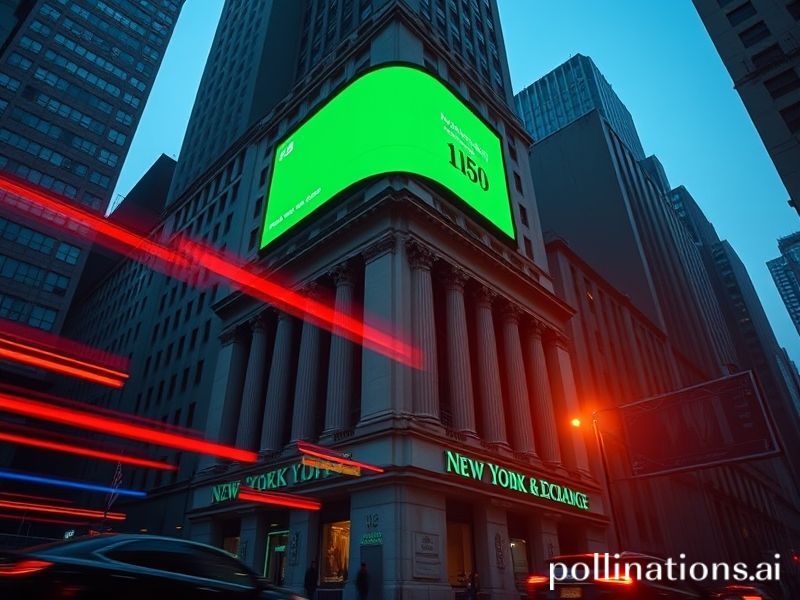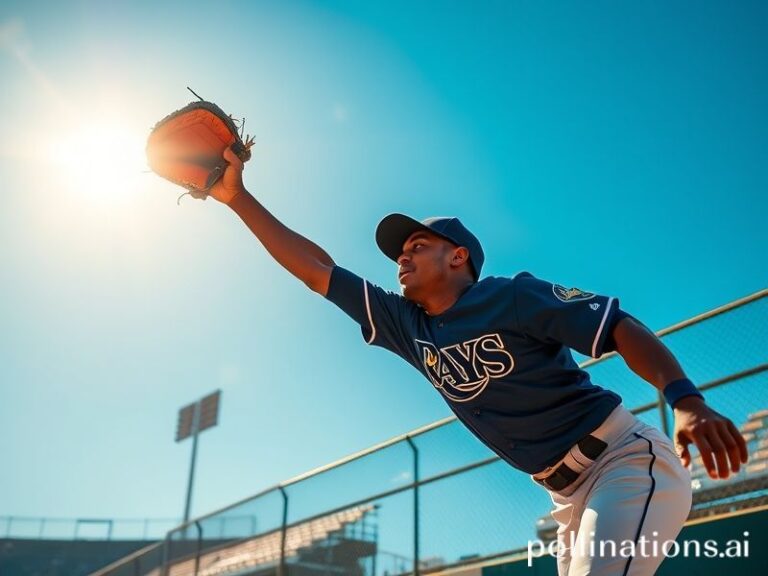Global Markets, Global Mood Swings: Why the Dow Jones Still Rules the World’s Anxiety Dreams
The Dow Jones Industrial Average: Humanity’s Favorite Slot Machine with a Flag on Top
By Santiago “Santi” Vargas, International Correspondent at Large
They ring a bell in New York at 9:30 a.m., and by 9:31 someone in Jakarta has already refreshed a brokerage app four times. This is the miracle of globalization: a 19th-century index—patented when cocaine was sold in soda and most of Asia was someone else’s colony—still governs 21st-century blood pressure.
The Dow’s thirty lovingly curated corporations are, in theory, a snapshot of American industrial might. In practice they are a Rorschach test for whatever nightmare the planet is collectively enduring. Boeing takes a nosedive (ironic, given its planes) and suddenly pension funds in Reykjavik wobble. Goldman sneezes, and an unpaid intern in Lagos wonders if her internship will be converted to “exposure-based compensation.” The index is mathematically absurd—price-weighted, not market-cap-weighted, a quirk that makes UnitedHealth worth more than Intel simply because its share price is higher, like ranking world leaders by height. Yet the Dow remains the world’s emotional barometer, the financial equivalent of checking your ex’s Instagram at 2 a.m.
Why does a glorified spreadsheet of 30 companies still matter in a world where Dogecoin can swing 40 percent because Elon tweeted a Shiba Inu meme? Because humans adore simple stories. The Dow is a campfire tale we tell one another while the forest burns: “Up 300 points, so maybe the apocalypse has been postponed until Thursday.” Central bankers from Frankfurt to Mumbai watch it like anxious parents monitoring a toddler’s fever, even though the kid ate sand for lunch.
Look east: the Shanghai Composite may be deeper in red than a Malbec spill on a wedding dress, but if the Dow rallies overnight, Chinese state media will roll out the term “resilient global recovery” before you can say “capital controls.” Europe, meanwhile, treats the Dow like an older cousin who went to America and got rich, vaguely distasteful yet consulted on every major decision. When the index sliced through 40,000 this spring, European commentators nodded solemnly, as though it confirmed their suspicions that Americans would indeed put a dollar sign on oxygen if given the chance.
South of the equator, the index is less a financial instrument and more a weather report. Brazilian soy exporters track it to guess when the Fed might pivot and kneecap the real. Nigerians eye it to divine when foreign investors will remember Africa exists. Australians, ever sportive, bet on closing levels the way they bet on two flies climbing a wall.
Of course, the Dow’s global power is partly logistical. The planet runs on dollar liquidity the way a pub crawl runs on beer: cut the taps and everyone staggers. When the index hiccups, cross-currency swap lines tighten, emerging-market debt yields spike, and somewhere a finance minister starts Googling “austere yet Instagrammable budget recipes.” The International Monetary Fund keeps a special rubber stamp labeled “Structural Adjustment” next to its Bloomberg terminal just in case.
There is a darker poetry to it. While diplomats argue in air-conditioned halls about climate reparations, the Dow quietly decides whether Exxon gets cheaper capital to drill more oil than God intended. Activists chain themselves to pipelines; algorithms chain themselves to quarterly earnings. The planet fries, but hey—3M beat expectations on adhesive sales, so futures are buoyant.
At this very moment, Tokyo’s salarymen are slurping 3 a.m. ramen while watching the pre-market ticker; Ghanaian fintech founders refresh Twitter for “sentiment”; and an algorithm in Zurich sells derivatives to another algorithm in Singapore, both named after Norse gods for that reassuringly apocalyptic touch. Humanity has built a Tower of Babel entirely from candlestick charts, and the higher it climbs, the more we congratulate ourselves on the view.
So when the bell rings again tomorrow and the numbers pirouette across screens from Lagos to Lima, remember: the Dow isn’t measuring value. It’s measuring the speed at which hope can be monetized, packaged, and resold before breakfast. And like any good horror story, it only works if we keep watching.







